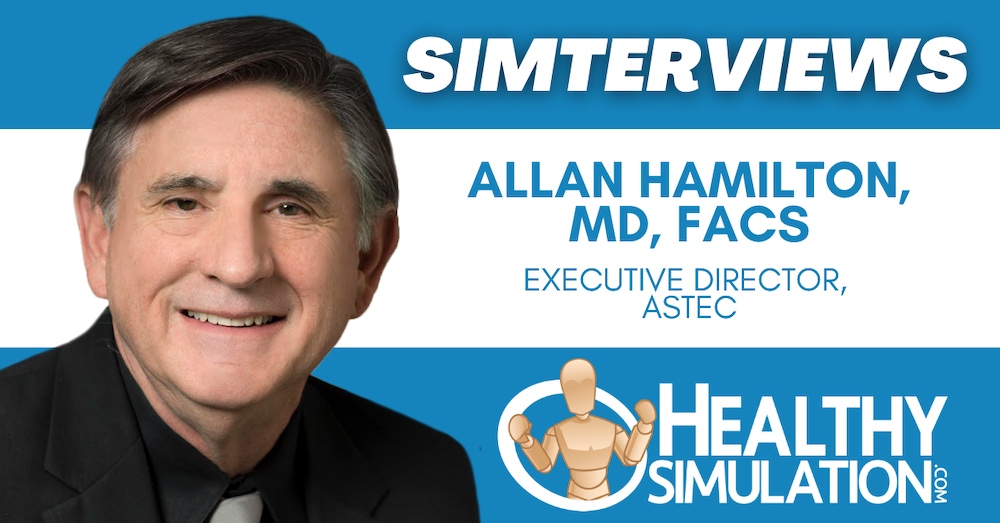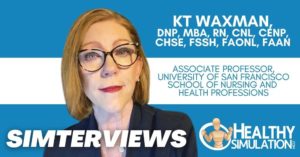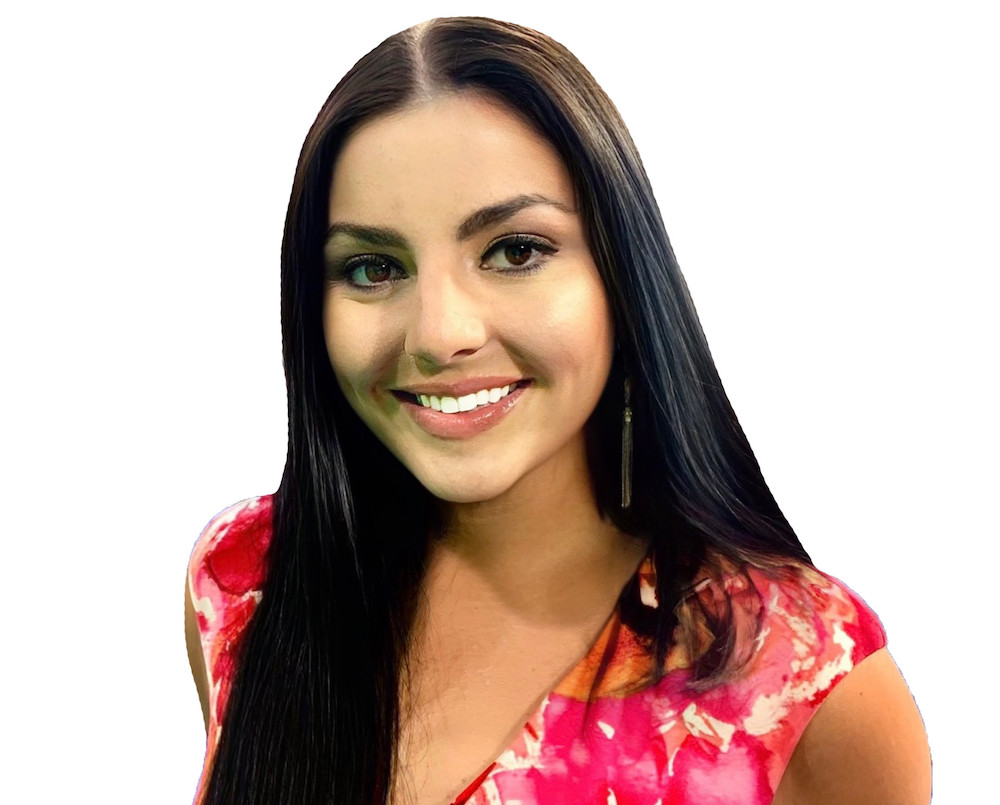Simterviews: Dr. Allan Hamilton | Executive Director, ASTEC
This week, HealthySimulation.com’s new healthcare simulation expert interview series “Simterviews” speaks with Dr. Allan Hamilton, MD, FACS, the executive director of the Arizona Simulation Technology and Education Center (ASTEC). Hamilton started his working life as janitor and went on to become a decorated Army veteran, a Harvard-trained brain surgeon, and a medical consultant for the TV show “Grey’s Anatomy”. His insights have helped to shape and inspire the thinking of educators, technology leaders, politicians, designers, filmmakers, ecologists and scientists around the world. Within the healthcare simulation industry, Hamilton combines his background in medicine, training and film to help educate learners on clinical simulation best practices to optimize patient safety outcomes.
HealthySimulation.com: What needs to happen for simulation to move to the next level of utilization?
Dr. Hamilton: It has to prove itself. In other words, there’s a lot about simulation training that inherently makes a lot of sense. The rubber meets the road in healthcare where you have to ask, “can I prove that this actually enhances outcomes? How do I measure that? How do I prove the economic value of it?” I think we’re getting there. We’ve gone through an infancy and we’ve gone through a lot of confusion. I think it’s sort of intuitive that healthcare simulation training makes sense, but I think we need to go back and look at specific examples where we can point to why and how it works. I think the other thing is telesimulation is going to play a big, big role in getting to the next level of utilization. We must arm ourselves for remote interaction.
Sponsored Content:
HealthySimulation.com: What is your greatest advice for those already engaged in simulation, who want to continue to maximize their outcomes and ROI moving forward?
Dr. Hamilton: I would say don’t let operational practicality get in the way of imagination. I think we’re involved in a field that can be inherently very creative. I’ve worked for the military, where there has been essentially enormous budgets to carry out simulation. I’ve worked in Hollywood, where we have enormous budgets to carry out simulation. One of the things that I’ve been impressed with is, in both those arenas, the real advances were made when people did not allow themselves to be bogged down in practicalities. Instead, they really had a vision of where simulation could go.
HealthySimulation.com: What is something that excites you about the current healthcare simulation industry? (A book, a website, a product, a service, research, conference, etc.)
Dr. Hamilton: A research article from Purdue University looked at how AI tools can help doctors and patients better prepare for surgery. I’m very, very excited about the role that AI will play in healthcare simulation training. This research serves as a pretty potent example of how AI is a very potent way of how the technology can be applied to learning.
Sponsored Content:
HealthySimulation.com: How has your military career influenced your interest in the field of healthcare simulation?
Dr. Hamilton: I think naturally, the role of the military is to basically train soldiers, airmen, Marines and sailors to be able to carry out their functions under extreme stress, which includes the fog of war. The military is really focused on how to enhance training so that they get the maximum performance out of combat troops. I think one of the things that I really focused on when I was working for the military was understanding how we created simulation in the laboratory in a way that actually delivered better performance in the field, and better performance under combat. Here, simulation had a very practical outcome, as the stakes were high. We really spent a lot of time thinking about how we were going to simulate things. We also spent a lot of time asking how simulation makes a soldier or a sailor, an airman or airwoman, better and safer under duress.
I think I just started off with thinking, here’s the maximum application of simulation. When I was in medicine, it was just natural. Here’s life and death, just in a different setting. The stakes are much higher in combat. It was a natural extension of how to train doctors and nurses to perform in a way that limits casualties. I was always impressed with how much we knew about the way soldiers and pilots were training, but how little we knew about the way residents were training. I was head of the department of surgery and said, “How’s it possible that we evaluate residents on their knowledge and hands?”
While in the military, we had these extensive assessments and measures of how a particular soldier, enlisted personnel or officers perform in the field, in combat and in exercises. We have a ton more data. It just struck me as very peculiar that we weren’t applying the lessons that have been learned elsewhere. Back in 1995, the very first lecture I gave to the department of surgery as the new chairman was on the role of simulation in healthcare training. People looked at me like I was out of my mind at the time, but clinical simulation took off.
HealthySimulation.com: In what ways can the healthcare simulation industry learn from military and aviation simulation?
Dr. Hamilton: They need to understand that in healthcare, high-fidelity simulation has a particular role to play. We need to create progressive stress in an orchestrated fashion, the way we do in the military. We don’t send a soldier to a live-fire exercise on Day One. It’s sort of the same thing, we have to move and (take) progressive steps. The other thing is that there’s a much greater emphasis on assessment and evaluation, not to take away from the actual soldier or resident, but to evaluate how good the training is. The shoe needs to be sort of on the other foot. It’s not “How do I evaluate this particular learner?,” but “How well am I doing with a whole group of learners?” I use clinical simulation to better enhance the outcomes of my trainees.
Subscribe Now for More Great Simterviews!
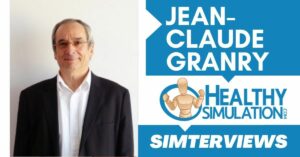
Simterview Avec le Professeur Jean Claude Granry, Pionnier Français de la Simulation en Santé
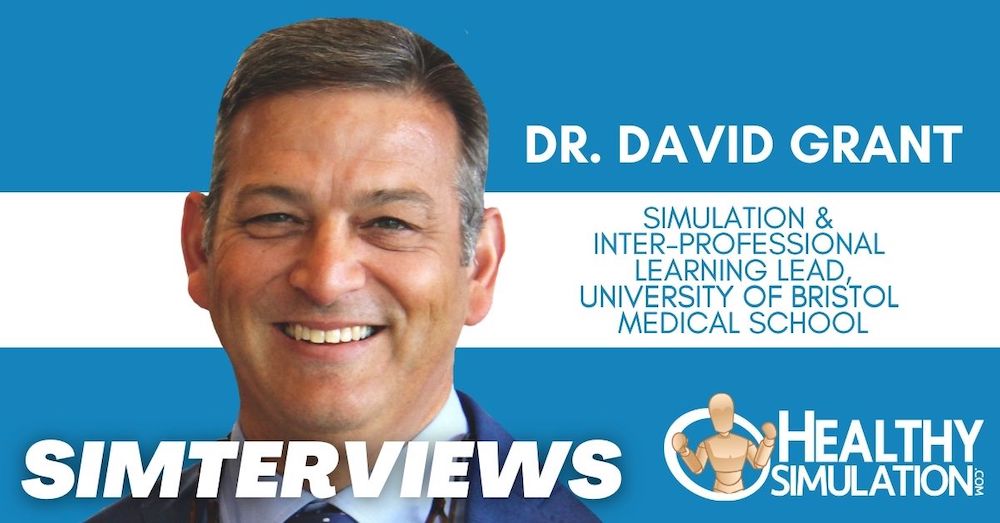
Simterviews: Dr. David Grant | Simulation Learning Lead, University of Bristol Medical School
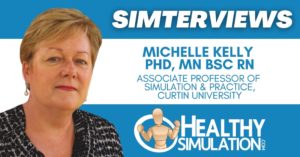
Simterviews: Dr. Michelle Kelly | Associate Professor of Simulation & Practice, Curtin University
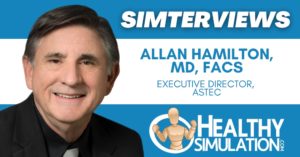
Simterviews: Dr. Allan Hamilton | Executive Director, ASTEC
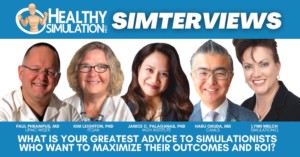
Simterviews: Medical Simulation Experts Discuss Ways to Maximize ROI
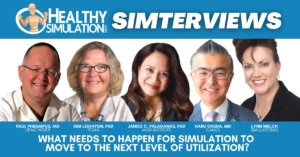
Simterviews: Medical Simulation Experts Discuss Next Level of Healthcare Simulation Utilization
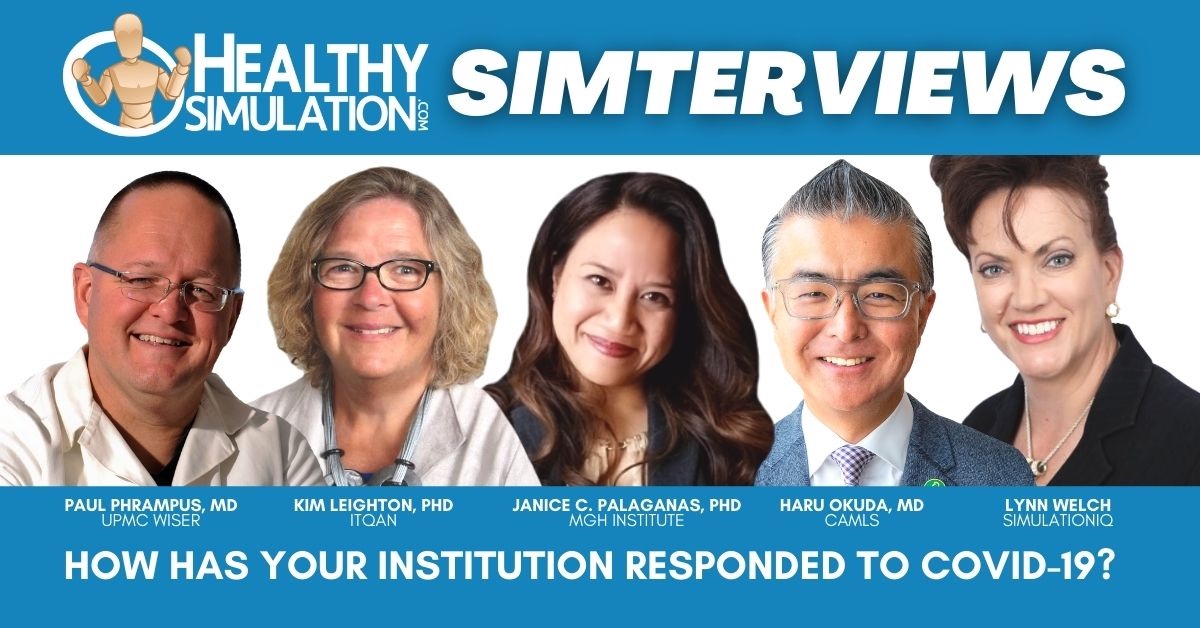
Simterviews: Medical Simulation Experts Discuss COVID-19 Responses
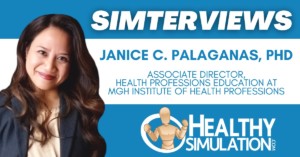
Simterviews: Dr. Janice Palaganas | Associate Director of PhD Program, MGH Institute
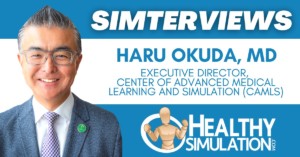
Simterviews: Dr. Haru Okuda | Executive Director, CAMLS
Lindsey Nolen is the Content Director for HealthySimulation.com. She is an award-winning journalist with years of experience writing about the many different facets of healthcare, including clinical simulation education and training. She also helped create content for the healthcare career information website, CareersinHealthcare.com.
Sponsored Content:



